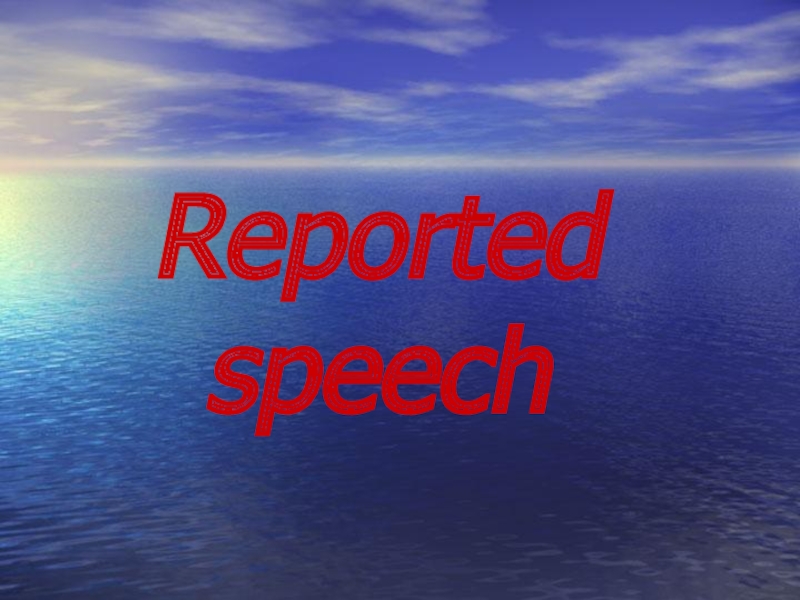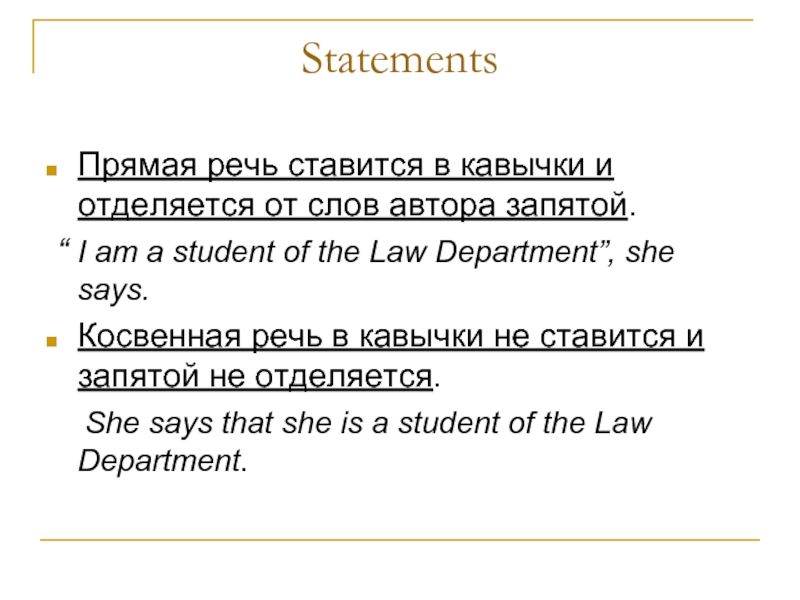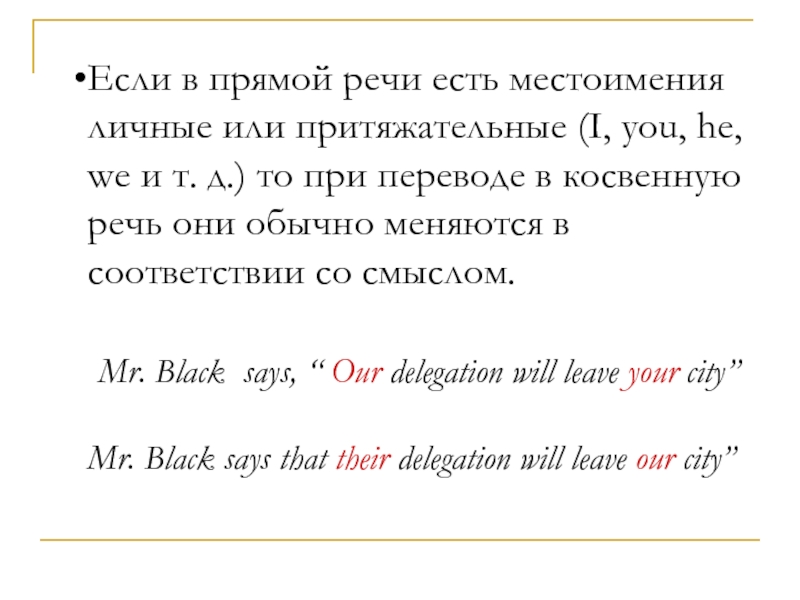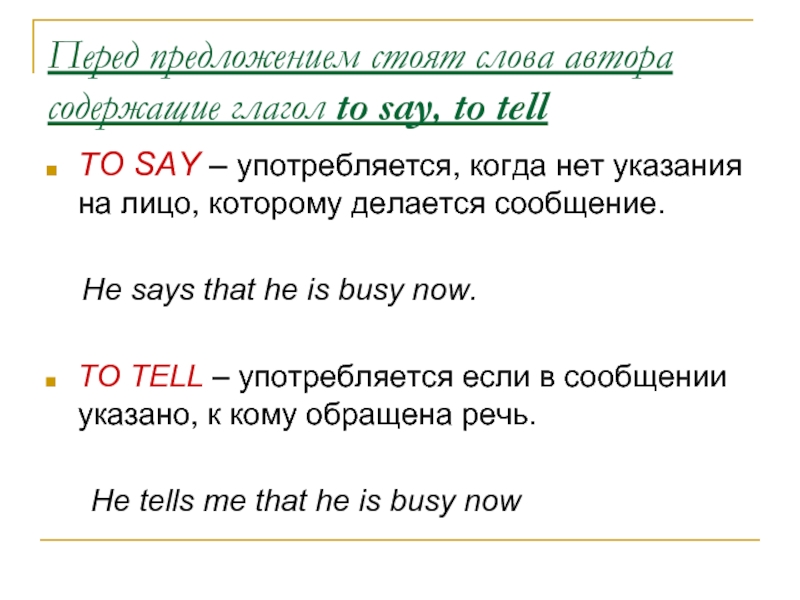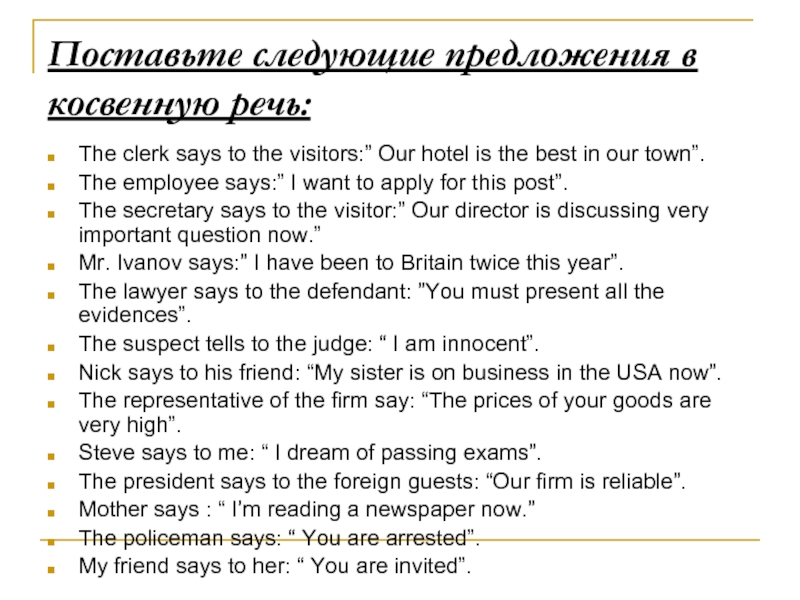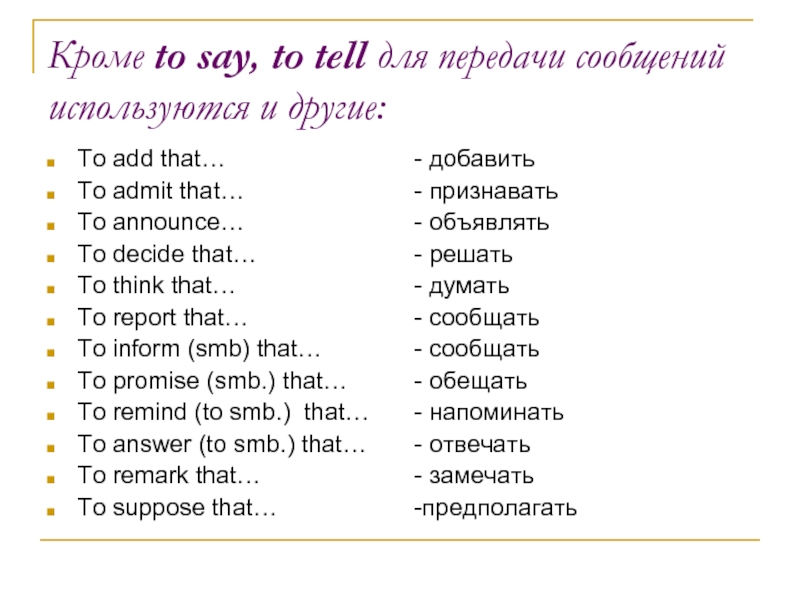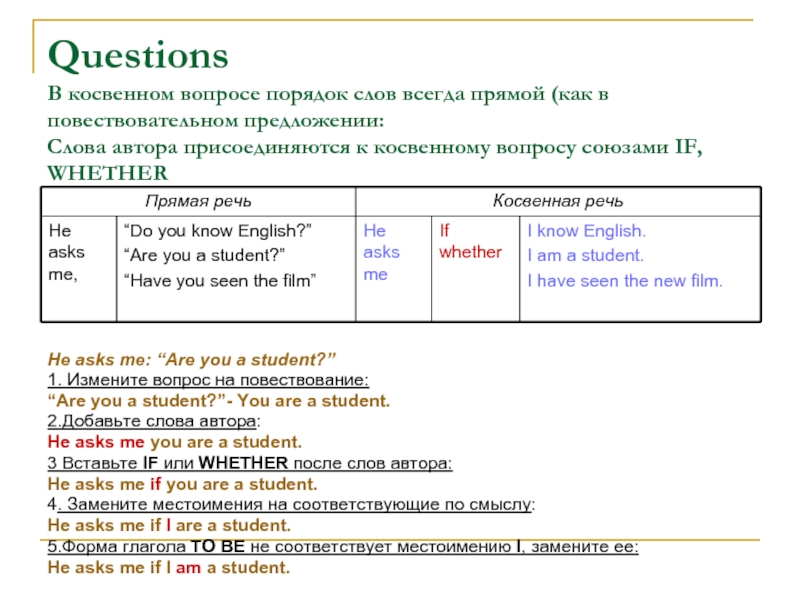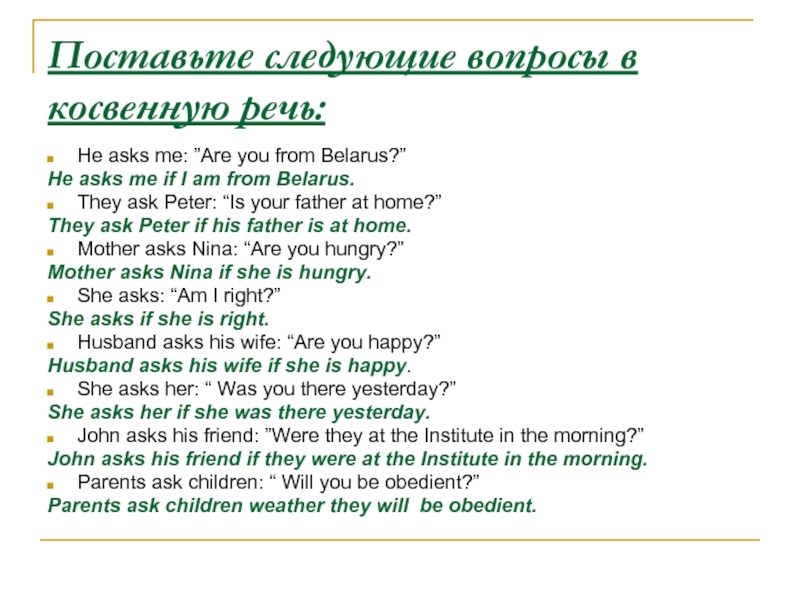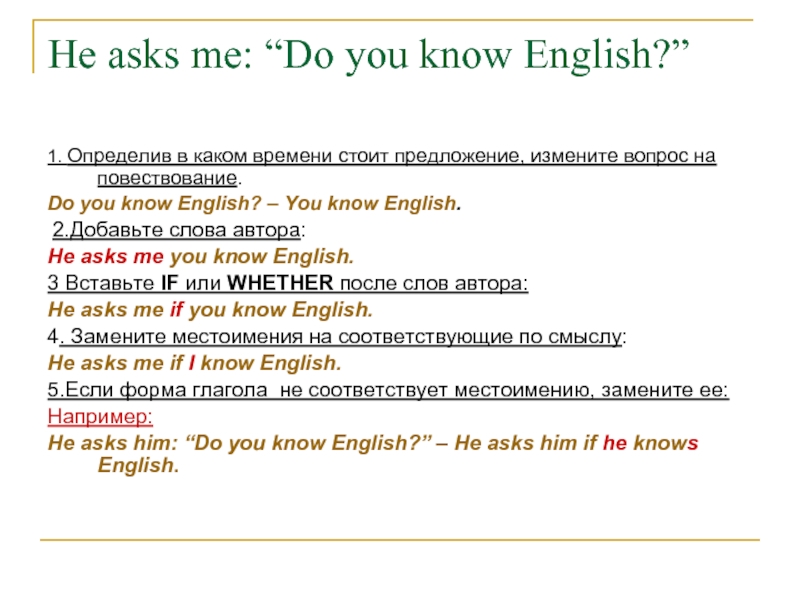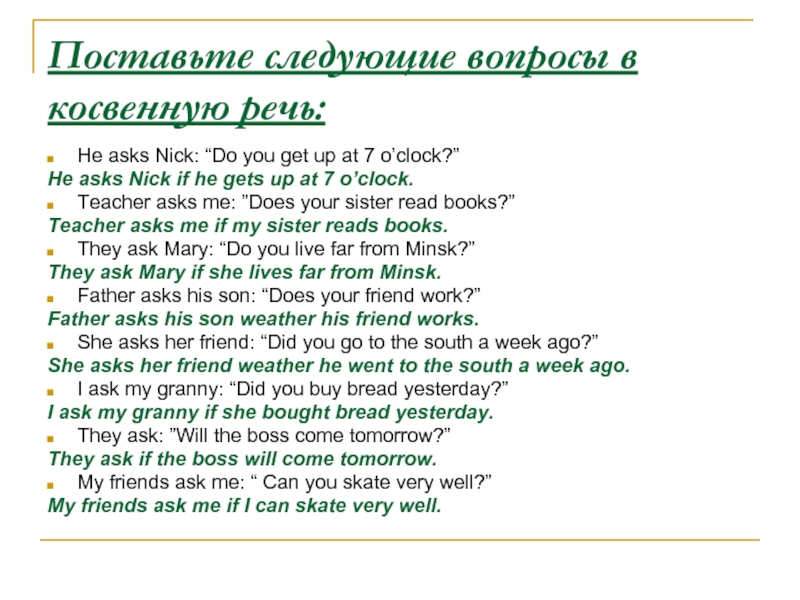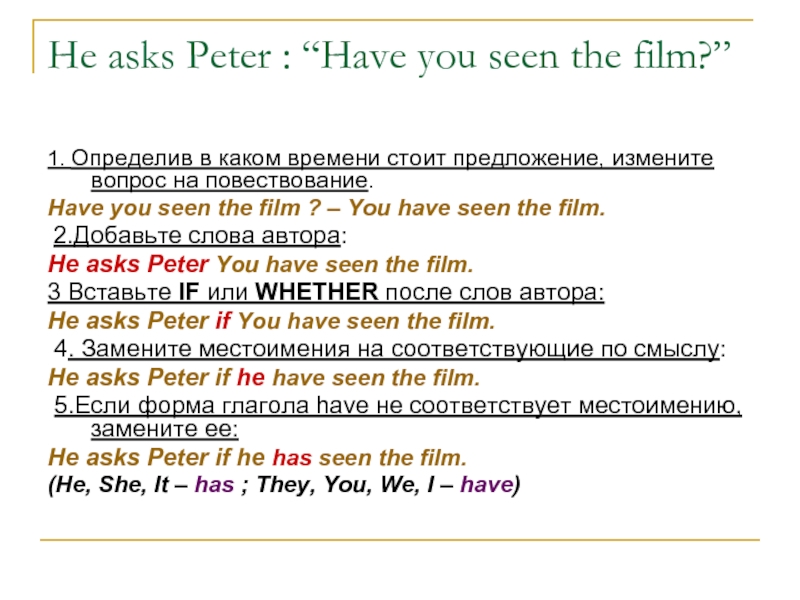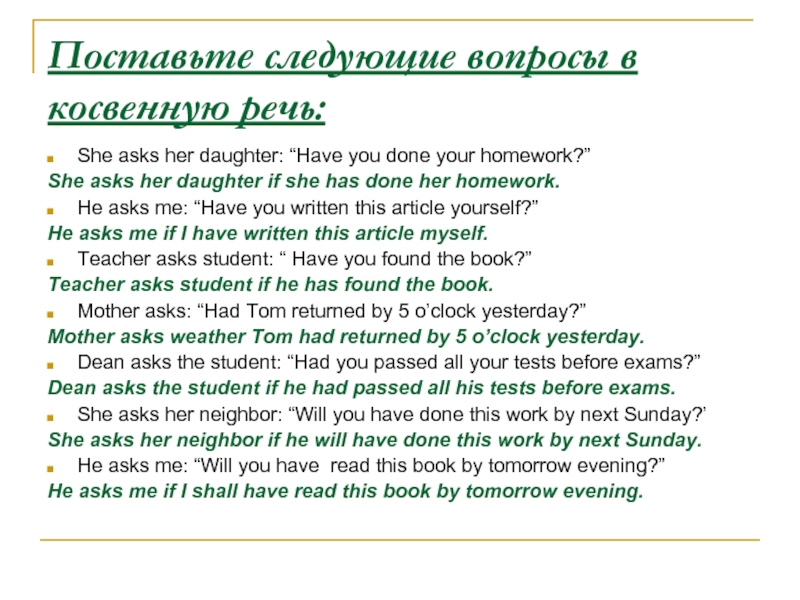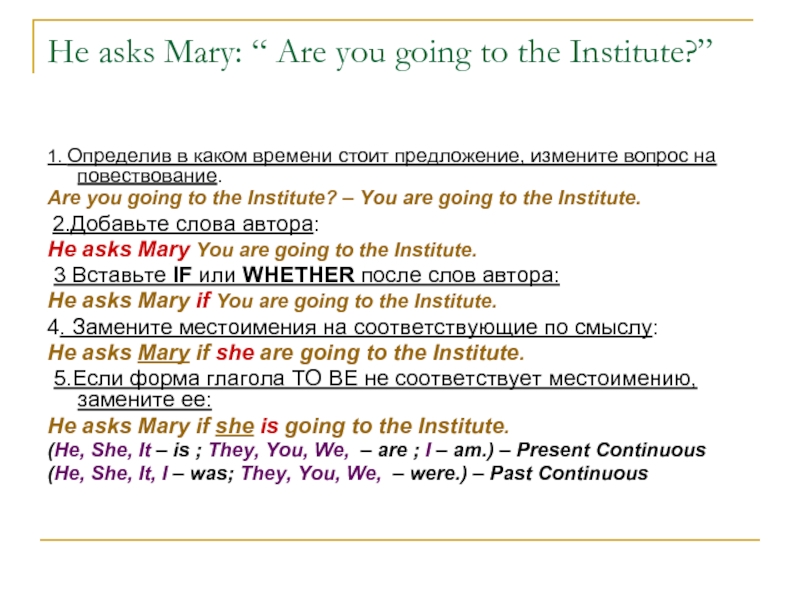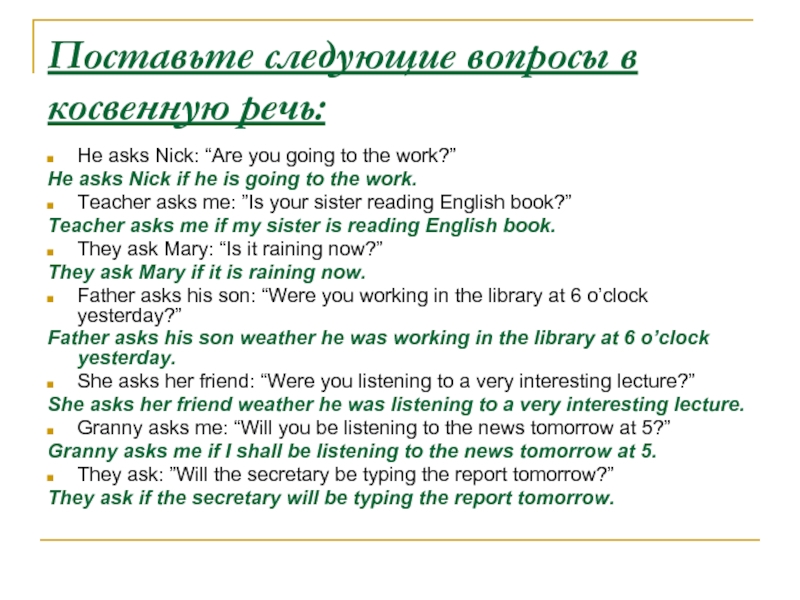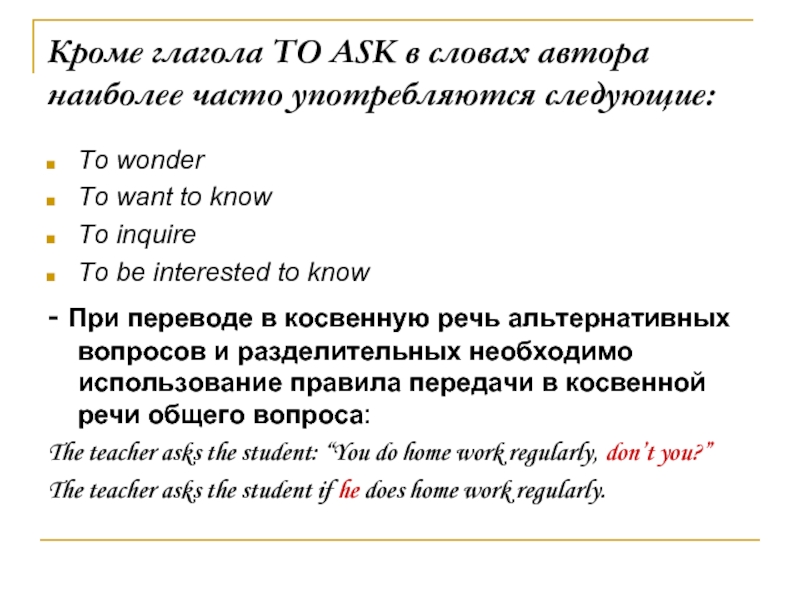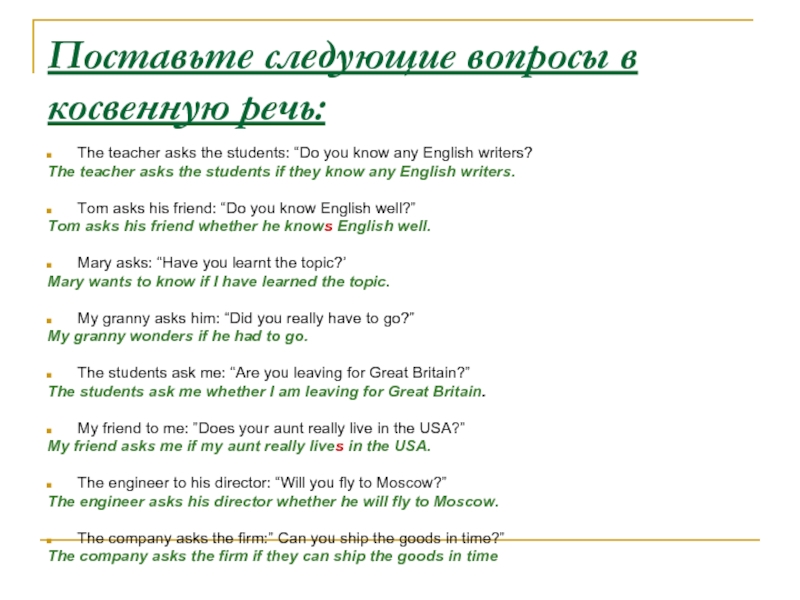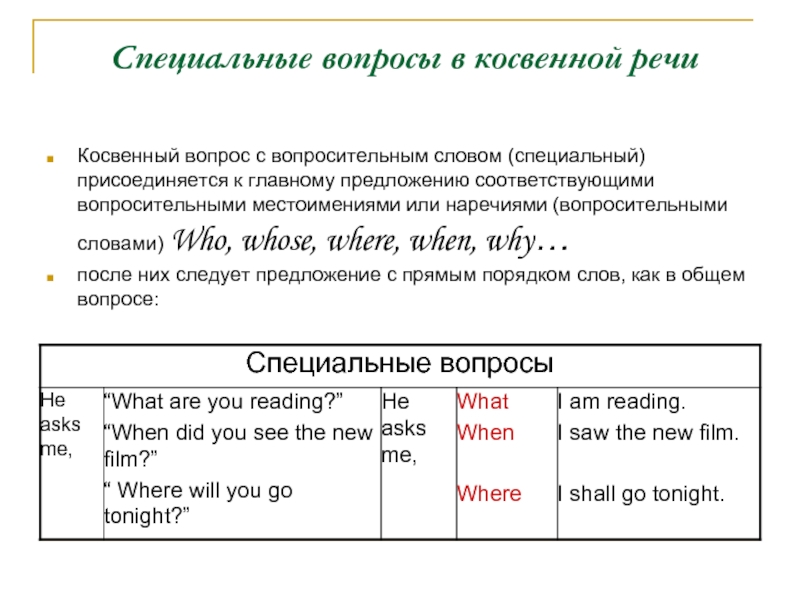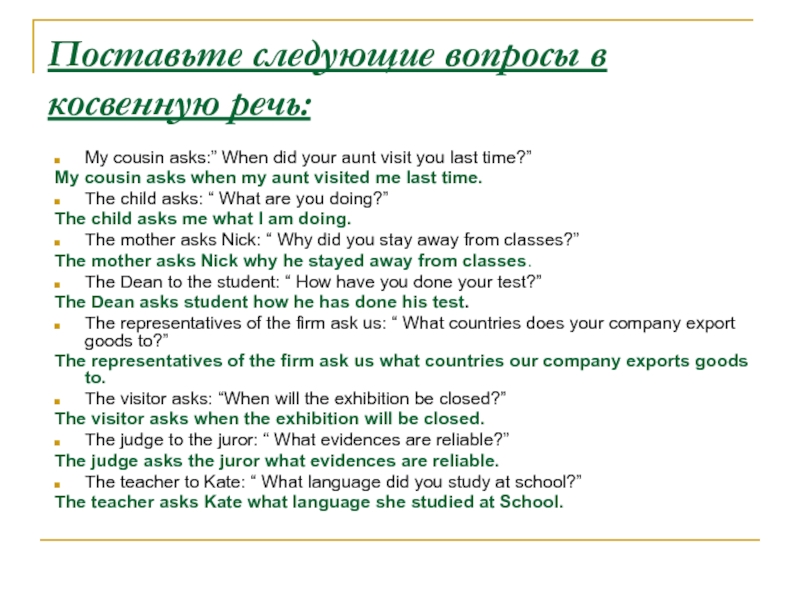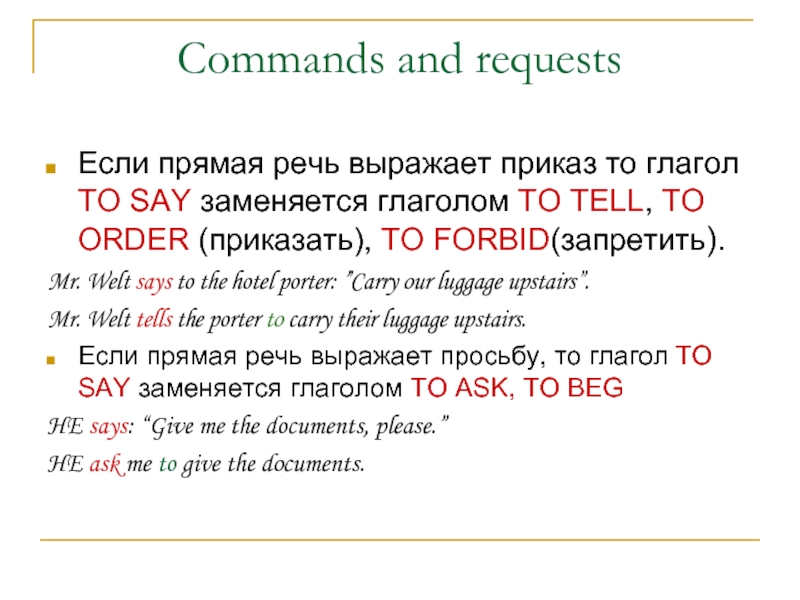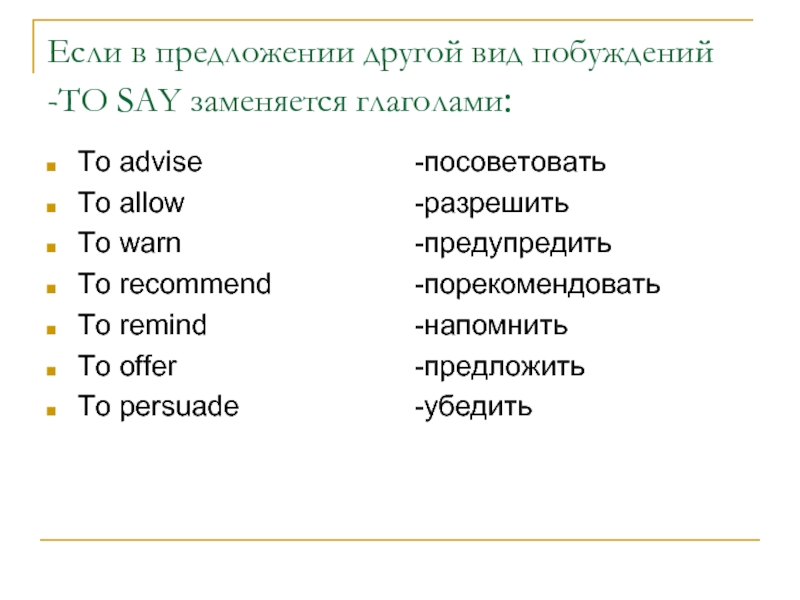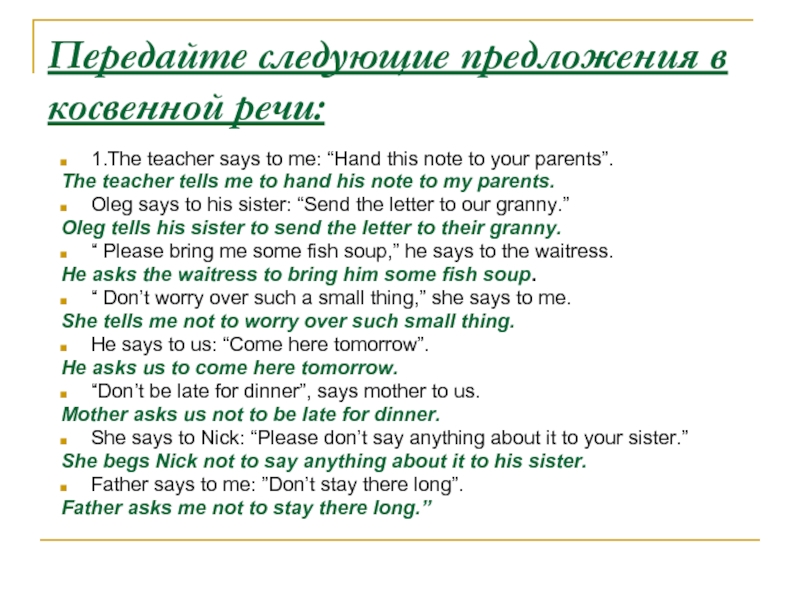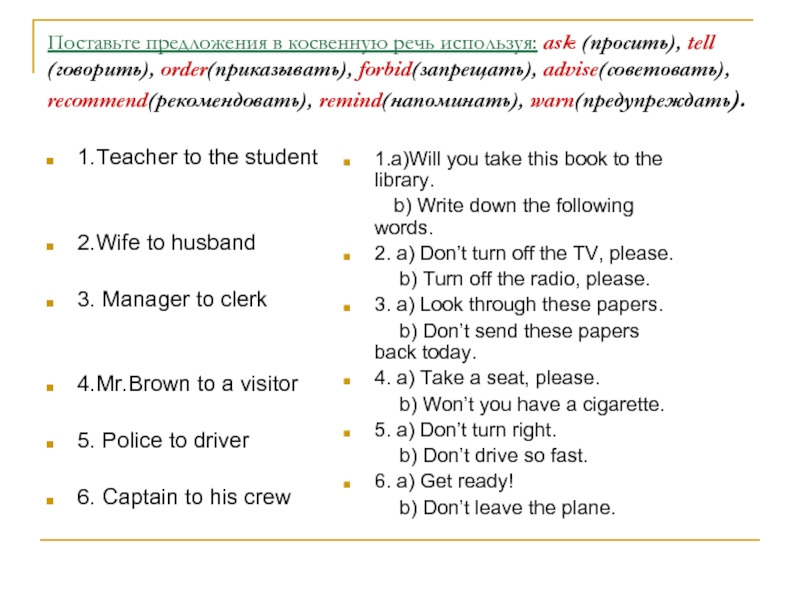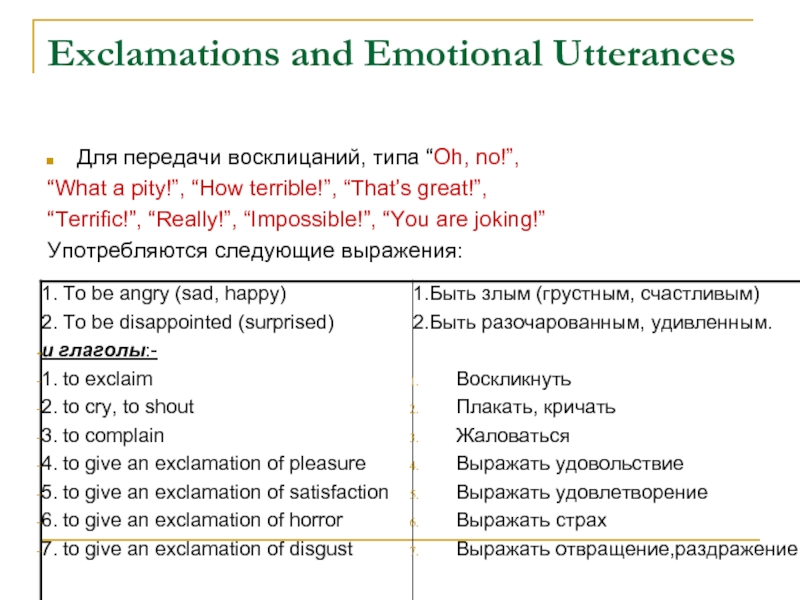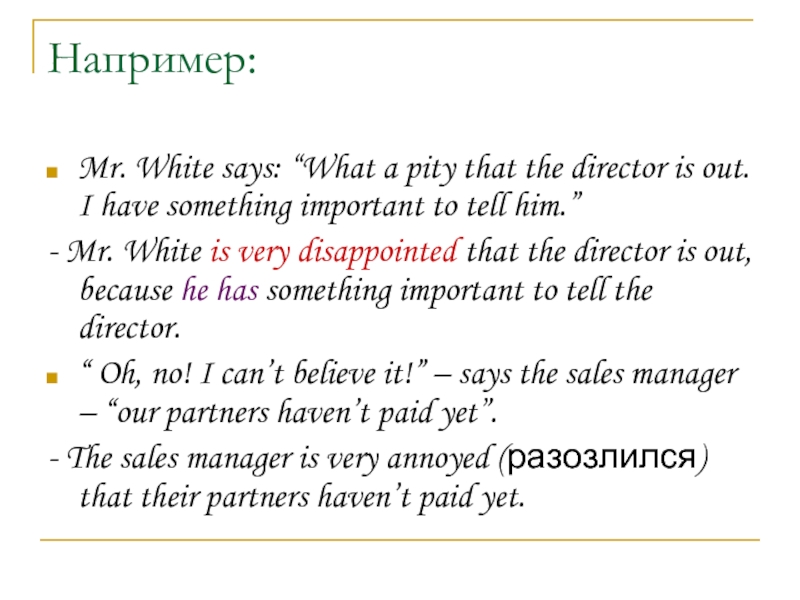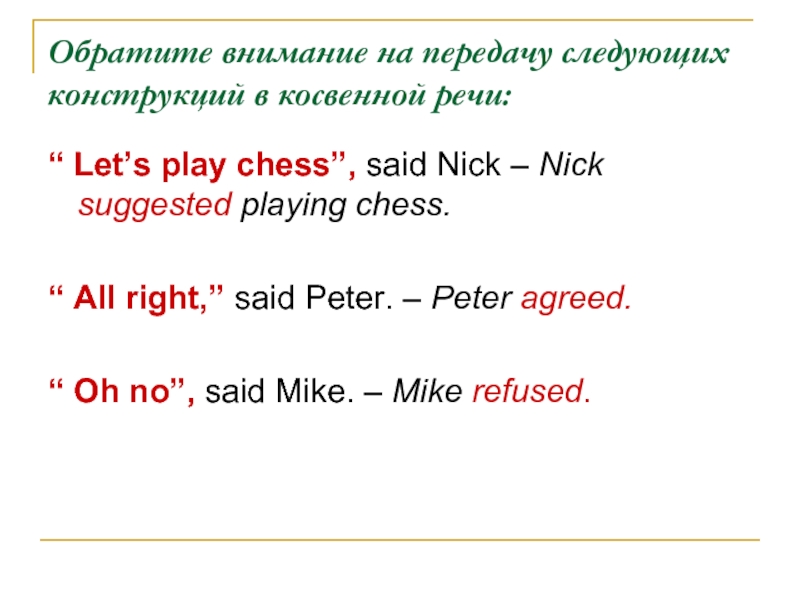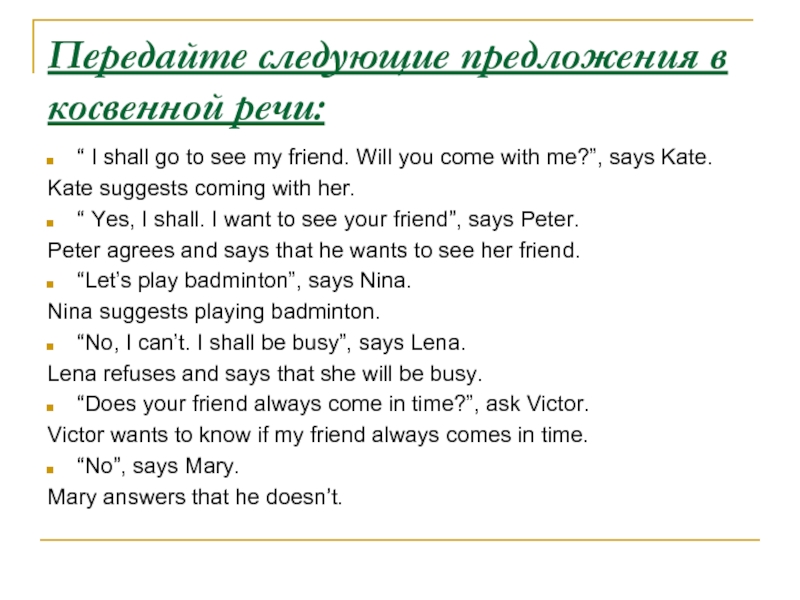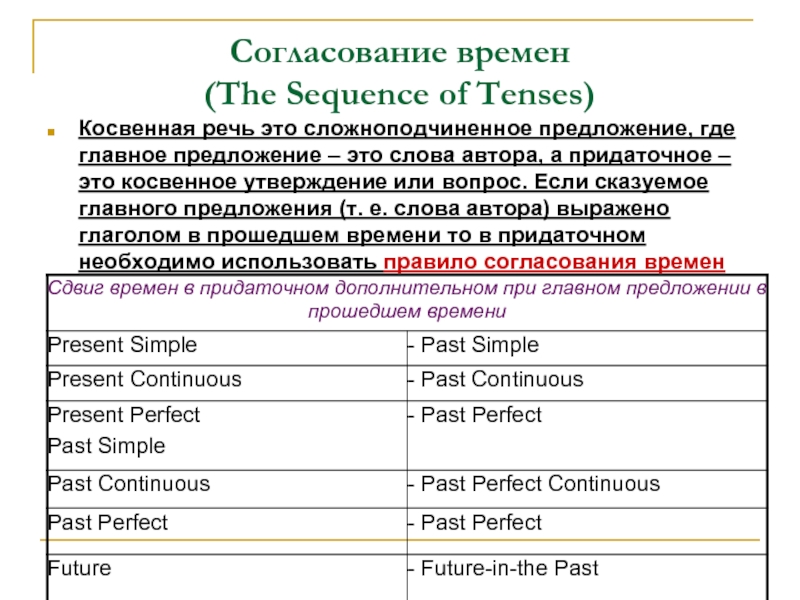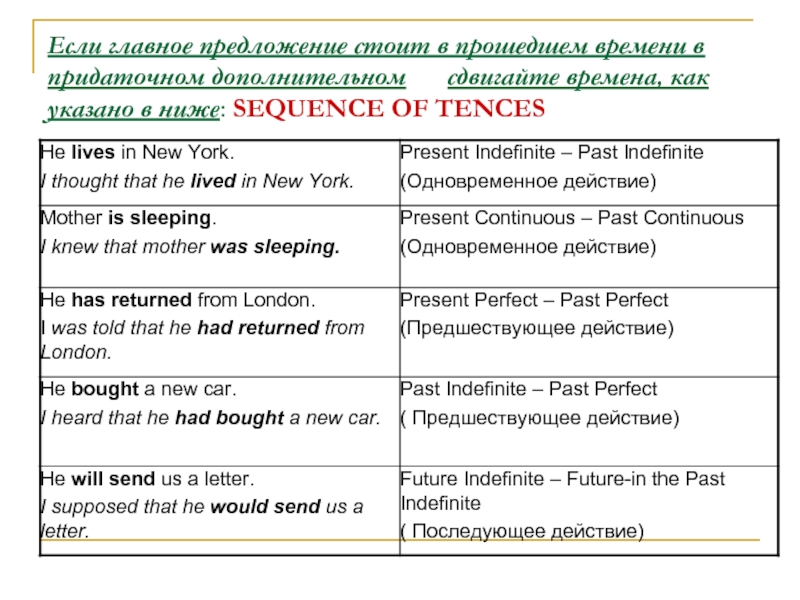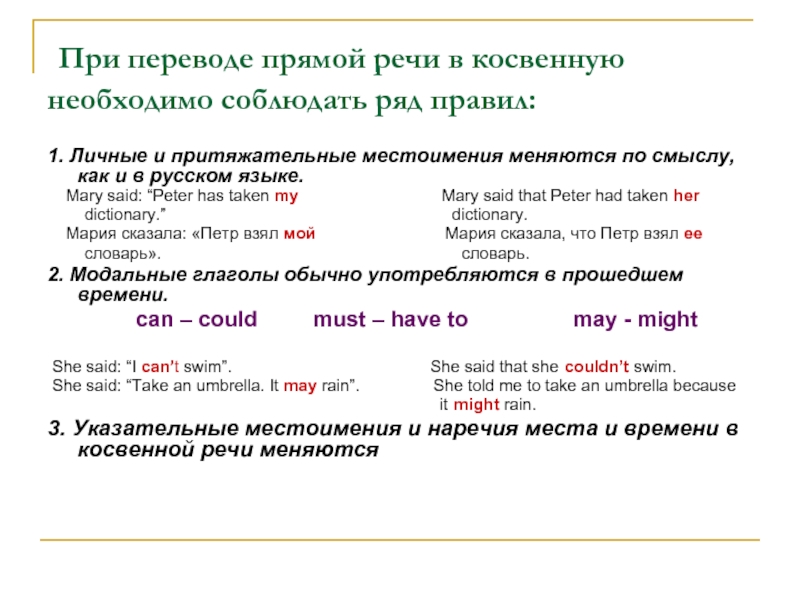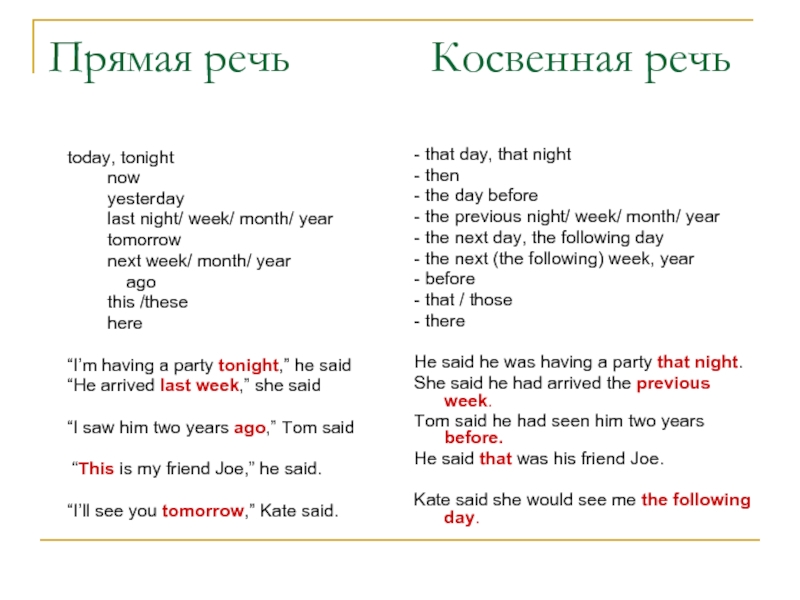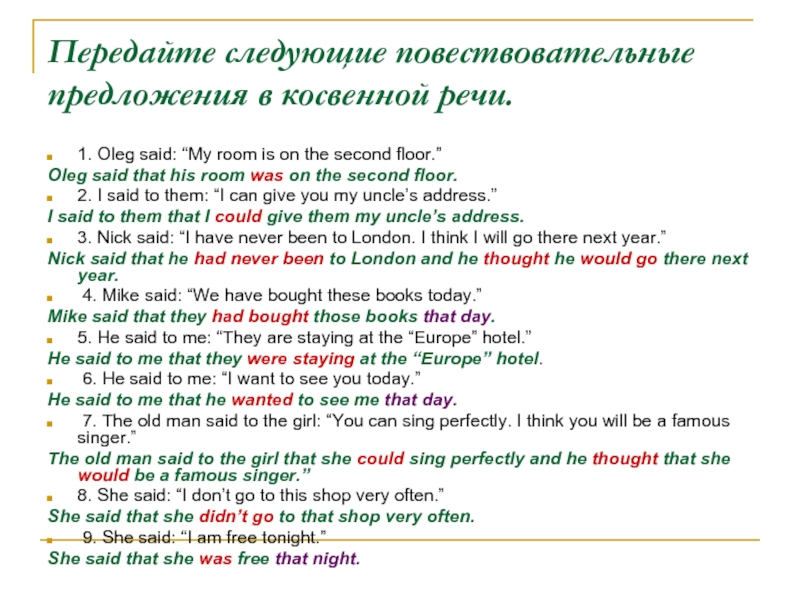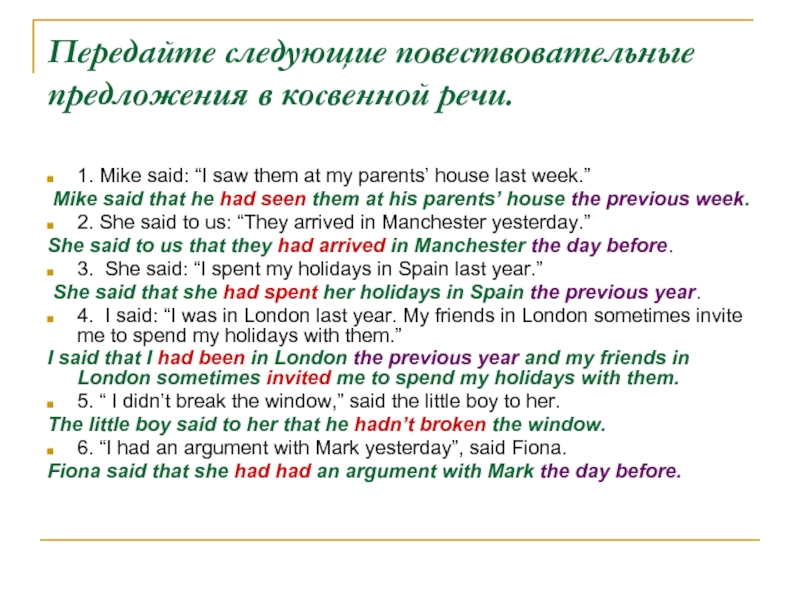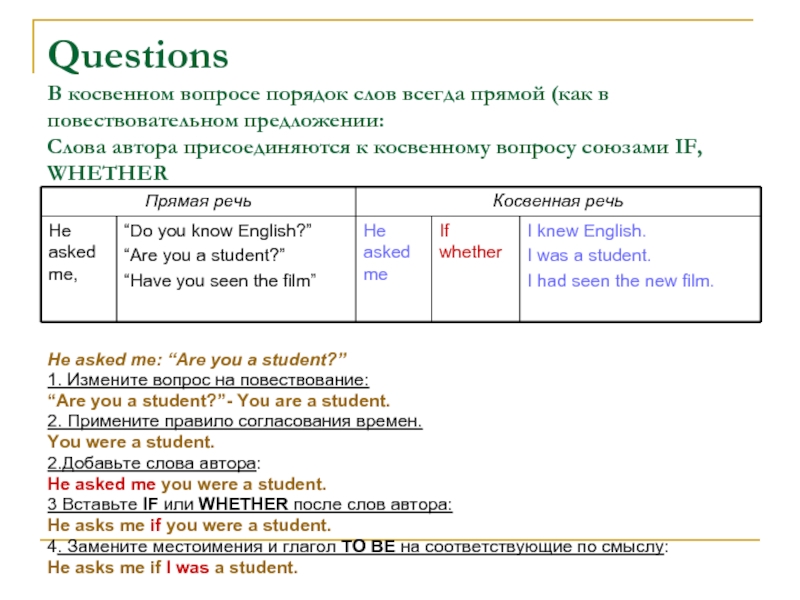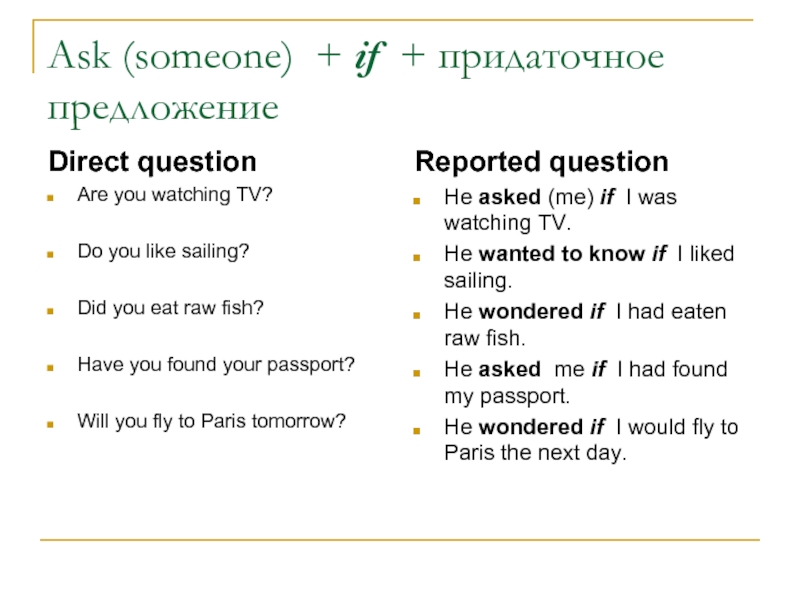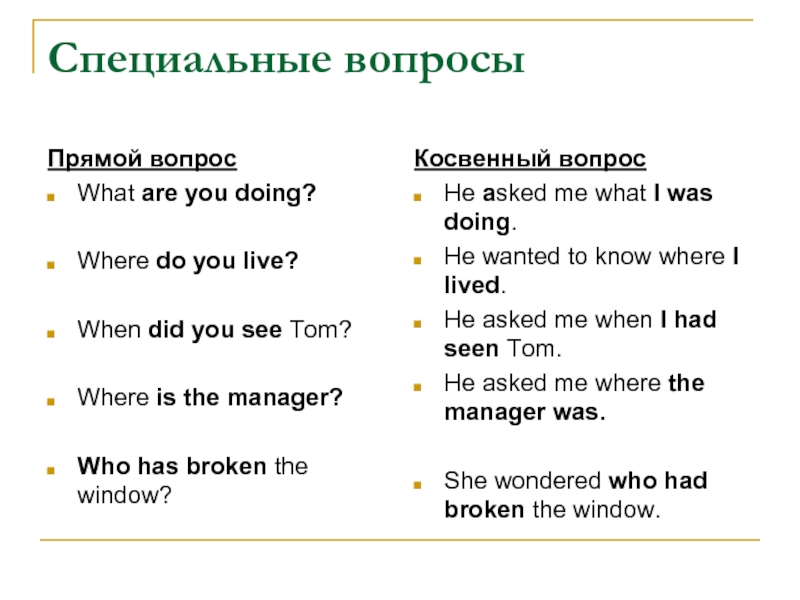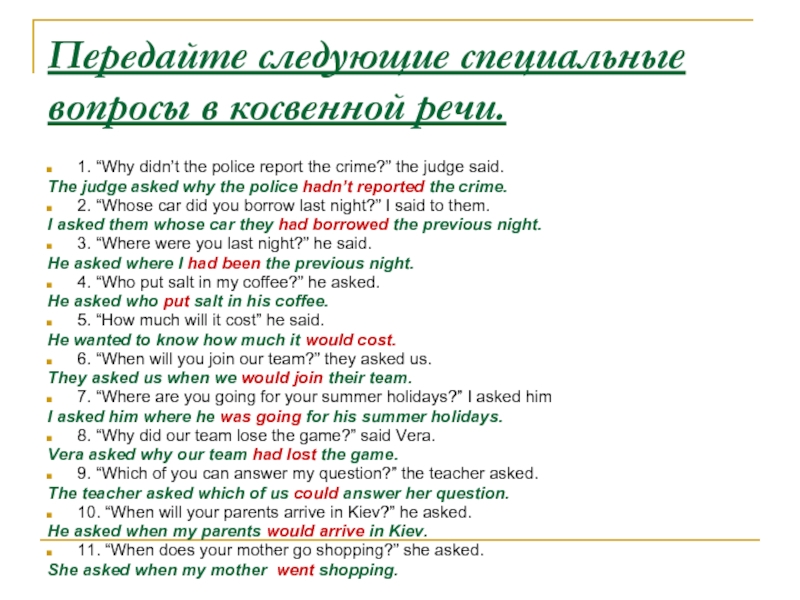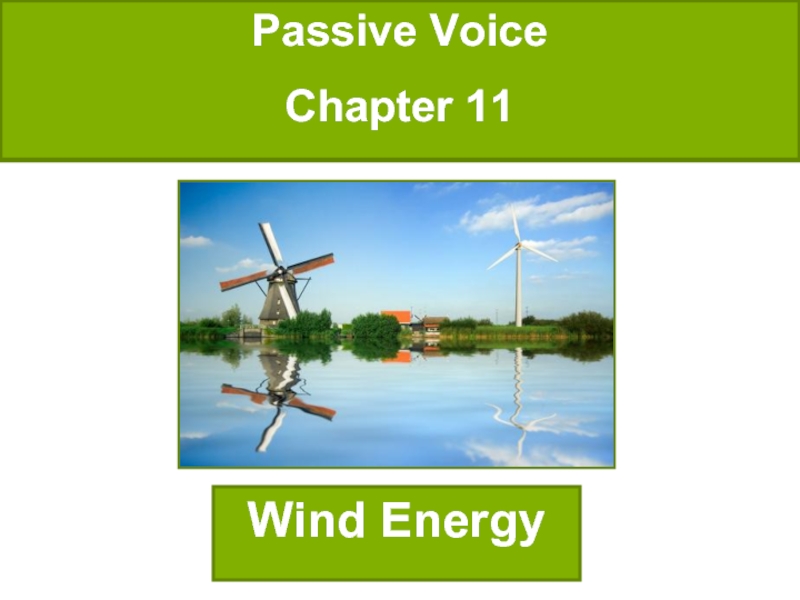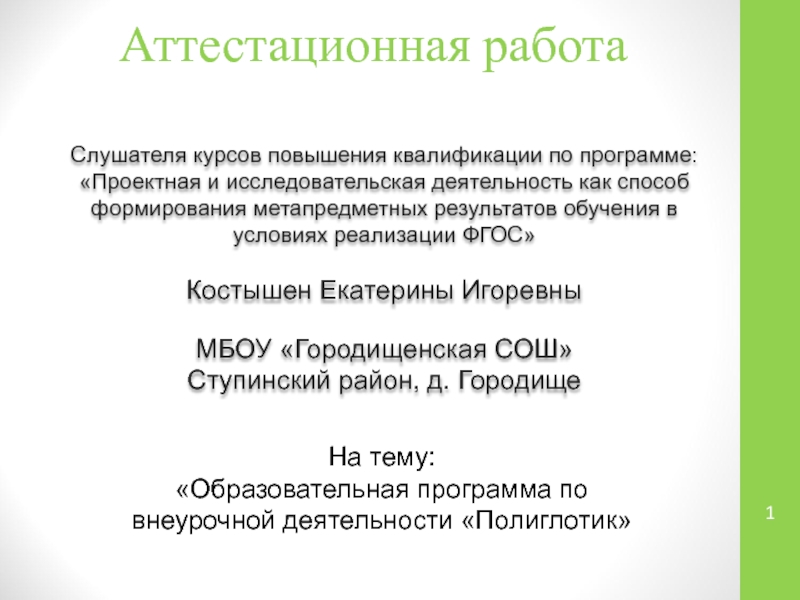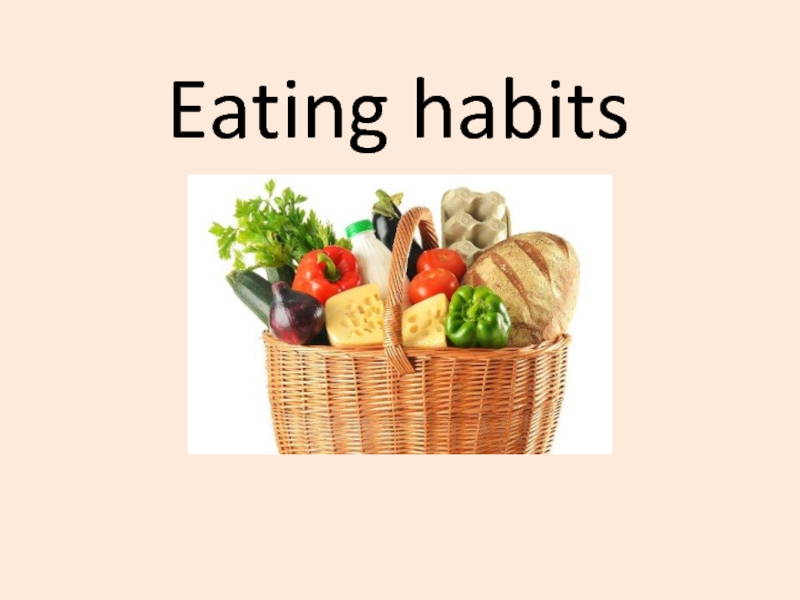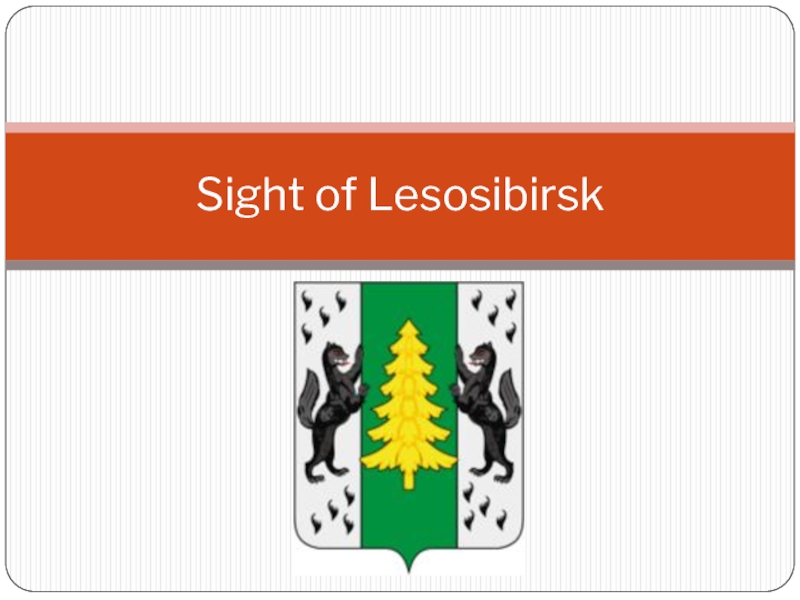- Главная
- Разное
- Дизайн
- Бизнес и предпринимательство
- Аналитика
- Образование
- Развлечения
- Красота и здоровье
- Финансы
- Государство
- Путешествия
- Спорт
- Недвижимость
- Армия
- Графика
- Культурология
- Еда и кулинария
- Лингвистика
- Английский язык
- Астрономия
- Алгебра
- Биология
- География
- Детские презентации
- Информатика
- История
- Литература
- Маркетинг
- Математика
- Медицина
- Менеджмент
- Музыка
- МХК
- Немецкий язык
- ОБЖ
- Обществознание
- Окружающий мир
- Педагогика
- Русский язык
- Технология
- Физика
- Философия
- Химия
- Шаблоны, картинки для презентаций
- Экология
- Экономика
- Юриспруденция
Reported speech презентация
Содержание
- 1. Reported speech
- 2. Statements Прямая речь ставится в кавычки и
- 3. Если в прямой речи есть местоимения личные
- 4. Перед предложением стоят слова автора содержащие глагол
- 5. Поставьте следующие предложения в косвенную речь: The
- 6. Кроме to say, to tell для передачи
- 7. Questions В косвенном вопросе порядок слов всегда
- 8. Поставьте следующие вопросы в косвенную речь: He
- 9. He asks me: “Do you know English?”
- 10. Поставьте следующие вопросы в косвенную речь: He
- 11. He asks Peter : “Have you seen
- 12. Поставьте следующие вопросы в косвенную речь: She
- 13. He asks Mary: “ Are you going
- 14. Поставьте следующие вопросы в косвенную речь: He
- 15. Кроме глагола TO ASK в словах автора
- 16. Поставьте следующие вопросы в косвенную речь: The
- 17. Специальные вопросы в косвенной речи Косвенный
- 18. Поставьте следующие вопросы в косвенную речь:
- 19. Commands and requests Если прямая речь выражает
- 20. Если в предложении другой вид побуждений -TO
- 21. Indirect commands Приказания и просьбы в косвенной
- 22. Передайте следующие предложения в косвенной речи: 1.The
- 25. Поставьте предложения в косвенную речь используя: ask
- 26. Exclamations and Emotional Utterances Для передачи восклицаний,
- 27. Например: Mr. White says: “What a pity
- 28. Слова или фразы, выражающие благодарность, поздравления, пожелания
- 29. Краткие ответы ”Yes” и “No” передаются в
- 30. Обратите внимание на передачу следующих конструкций в
- 31. Передайте следующие предложения в косвенной речи: “
- 34. Согласование времен (The Sequence of Tenses) Косвенная
- 35. Если главное предложение стоит в прошедшем времени
- 36. При переводе прямой речи в косвенную
- 37. Прямая речь
- 38. Передайте следующие повествовательные предложения в косвенной речи.
- 39. Передайте следующие повествовательные предложения в косвенной речи.
- 40. Questions В косвенном вопросе порядок слов всегда
- 41. Ask (someone) + if + придаточное предложение
- 42. Передайте следующие общие вопросы в косвенной
- 43. Специальные вопросы в косвенной речи
- 44. Специальные вопросы Прямой вопрос What are you
- 45. Передайте следующие специальные вопросы в косвенной речи.
Слайд 2Statements
Прямая речь ставится в кавычки и отделяется от слов автора запятой.
Косвенная речь в кавычки не ставится и запятой не отделяется.
She says that she is a student of the Law Department.
Слайд 3Если в прямой речи есть местоимения личные или притяжательные (I, you,
Слайд 4Перед предложением стоят слова автора содержащие глагол to say, to tell
TO
He says that he is busy now.
TO TELL – употребляется если в сообщении указано, к кому обращена речь.
He tells me that he is busy now
Слайд 5Поставьте следующие предложения в косвенную речь:
The clerk says to the visitors:”
The employee says:” I want to apply for this post”.
The secretary says to the visitor:” Our director is discussing very important question now.”
Mr. Ivanov says:” I have been to Britain twice this year”.
The lawyer says to the defendant: ”You must present all the evidences”.
The suspect tells to the judge: “ I am innocent”.
Nick says to his friend: “My sister is on business in the USA now”.
The representative of the firm say: “The prices of your goods are very high”.
Steve says to me: “ I dream of passing exams”.
The president says to the foreign guests: “Our firm is reliable”.
Mother says : “ I’m reading a newspaper now.”
The policeman says: “ You are arrested”.
My friend says to her: “ You are invited”.
Слайд 6Кроме to say, to tell для передачи сообщений используются и другие:
To
To admit that…
To announce…
To decide that…
To think that…
To report that…
To inform (smb) that…
To promise (smb.) that…
To remind (to smb.) that…
To answer (to smb.) that…
To remark that…
To suppose that…
- добавить
- признавать
- объявлять
- решать
- думать
- сообщать
- сообщать
- обещать
- напоминать
- отвечать
- замечать
-предполагать
Слайд 7Questions В косвенном вопросе порядок слов всегда прямой (как в повествовательном предложении: Слова
He asks me: “Are you a student?”
1. Измените вопрос на повествование:
“Are you a student?”- You are a student.
2.Добавьте слова автора:
He asks me you are a student.
3 Вставьте IF или WHETHER после слов автора:
He asks me if you are a student.
4. Замените местоимения на соответствующие по смыслу:
He asks me if I are a student.
5.Форма глагола TO BE не соответствует местоимению I, замените ее:
He asks me if I am a student.
Слайд 8Поставьте следующие вопросы в косвенную речь:
He asks me: ”Are you from
He asks me if I am from Belarus.
They ask Peter: “Is your father at home?”
They ask Peter if his father is at home.
Mother asks Nina: “Are you hungry?”
Mother asks Nina if she is hungry.
She asks: “Am I right?”
She asks if she is right.
Husband asks his wife: “Are you happy?”
Husband asks his wife if she is happy.
She asks her: “ Was you there yesterday?”
She asks her if she was there yesterday.
John asks his friend: ”Were they at the Institute in the morning?”
John asks his friend if they were at the Institute in the morning.
Parents ask children: “ Will you be obedient?”
Parents ask children weather they will be obedient.
Слайд 9He asks me: “Do you know English?”
1. Определив в каком времени
Do you know English? – You know English.
2.Добавьте слова автора:
He asks me you know English.
3 Вставьте IF или WHETHER после слов автора:
He asks me if you know English.
4. Замените местоимения на соответствующие по смыслу:
He asks me if I know English.
5.Если форма глагола не соответствует местоимению, замените ее:
Например:
He asks him: “Do you know English?” – He asks him if he knows English.
Слайд 10Поставьте следующие вопросы в косвенную речь:
He asks Nick: “Do you get
He asks Nick if he gets up at 7 o’clock.
Teacher asks me: ”Does your sister read books?”
Teacher asks me if my sister reads books.
They ask Mary: “Do you live far from Minsk?”
They ask Mary if she lives far from Minsk.
Father asks his son: “Does your friend work?”
Father asks his son weather his friend works.
She asks her friend: “Did you go to the south a week ago?”
She asks her friend weather he went to the south a week ago.
I ask my granny: “Did you buy bread yesterday?”
I ask my granny if she bought bread yesterday.
They ask: ”Will the boss come tomorrow?”
They ask if the boss will come tomorrow.
My friends ask me: “ Can you skate very well?”
My friends ask me if I can skate very well.
Слайд 11He asks Peter : “Have you seen the film?”
1. Определив
Have you seen the film ? – You have seen the film.
2.Добавьте слова автора:
He asks Peter You have seen the film.
3 Вставьте IF или WHETHER после слов автора:
He asks Peter if You have seen the film.
4. Замените местоимения на соответствующие по смыслу:
He asks Peter if he have seen the film.
5.Если форма глагола have не соответствует местоимению, замените ее:
He asks Peter if he has seen the film.
(He, She, It – has ; They, You, We, I – have)
Слайд 12Поставьте следующие вопросы в косвенную речь:
She asks her daughter: “Have you
She asks her daughter if she has done her homework.
He asks me: “Have you written this article yourself?”
He asks me if I have written this article myself.
Teacher asks student: “ Have you found the book?”
Teacher asks student if he has found the book.
Mother asks: “Had Tom returned by 5 o’clock yesterday?”
Mother asks weather Tom had returned by 5 o’clock yesterday.
Dean asks the student: “Had you passed all your tests before exams?”
Dean asks the student if he had passed all his tests before exams.
She asks her neighbor: “Will you have done this work by next Sunday?’
She asks her neighbor if he will have done this work by next Sunday.
He asks me: “Will you have read this book by tomorrow evening?”
He asks me if I shall have read this book by tomorrow evening.
Слайд 13He asks Mary: “ Are you going to the Institute?”
1. Определив
Are you going to the Institute? – You are going to the Institute.
2.Добавьте слова автора:
He asks Mary You are going to the Institute.
3 Вставьте IF или WHETHER после слов автора:
He asks Mary if You are going to the Institute.
4. Замените местоимения на соответствующие по смыслу:
He asks Mary if she are going to the Institute.
5.Если форма глагола TO BE не соответствует местоимению, замените ее:
He asks Mary if she is going to the Institute.
(He, She, It – is ; They, You, We, – are ; I – am.) – Present Continuous
(He, She, It, I – was; They, You, We, – were.) – Past Continuous
Слайд 14Поставьте следующие вопросы в косвенную речь:
He asks Nick: “Are you going
He asks Nick if he is going to the work.
Teacher asks me: ”Is your sister reading English book?”
Teacher asks me if my sister is reading English book.
They ask Mary: “Is it raining now?”
They ask Mary if it is raining now.
Father asks his son: “Were you working in the library at 6 o’clock yesterday?”
Father asks his son weather he was working in the library at 6 o’clock yesterday.
She asks her friend: “Were you listening to a very interesting lecture?”
She asks her friend weather he was listening to a very interesting lecture.
Granny asks me: “Will you be listening to the news tomorrow at 5?”
Granny asks me if I shall be listening to the news tomorrow at 5.
They ask: ”Will the secretary be typing the report tomorrow?”
They ask if the secretary will be typing the report tomorrow.
Слайд 15Кроме глагола TO ASK в словах автора наиболее часто употребляются следующие:
To
To want to know
To inquire
To be interested to know
- При переводе в косвенную речь альтернативных вопросов и разделительных необходимо использование правила передачи в косвенной речи общего вопроса:
The teacher asks the student: “You do home work regularly, don’t you?”
The teacher asks the student if he does home work regularly.
Слайд 16Поставьте следующие вопросы в косвенную речь:
The teacher asks the students: “Do
The teacher asks the students if they know any English writers.
Tom asks his friend: “Do you know English well?”
Tom asks his friend whether he knows English well.
Mary asks: “Have you learnt the topic?’
Mary wants to know if I have learned the topic.
My granny asks him: “Did you really have to go?”
My granny wonders if he had to go.
The students ask me: “Are you leaving for Great Britain?”
The students ask me whether I am leaving for Great Britain.
My friend to me: ”Does your aunt really live in the USA?”
My friend asks me if my aunt really lives in the USA.
The engineer to his director: “Will you fly to Moscow?”
The engineer asks his director whether he will fly to Moscow.
The company asks the firm:” Can you ship the goods in time?”
The company asks the firm if they can ship the goods in time
Слайд 17 Специальные вопросы в косвенной речи
Косвенный вопрос с вопросительным словом (специальный)
после них следует предложение с прямым порядком слов, как в общем вопросе:
Слайд 18Поставьте следующие вопросы в косвенную речь:
My cousin asks:” When did your
My cousin asks when my aunt visited me last time.
The child asks: “ What are you doing?”
The child asks me what I am doing.
The mother asks Nick: “ Why did you stay away from classes?”
The mother asks Nick why he stayed away from classes.
The Dean to the student: “ How have you done your test?”
The Dean asks student how he has done his test.
The representatives of the firm ask us: “ What countries does your company export goods to?”
The representatives of the firm ask us what countries our company exports goods to.
The visitor asks: “When will the exhibition be closed?”
The visitor asks when the exhibition will be closed.
The judge to the juror: “ What evidences are reliable?”
The judge asks the juror what evidences are reliable.
The teacher to Kate: “ What language did you study at school?”
The teacher asks Kate what language she studied at School.
Слайд 19Commands and requests
Если прямая речь выражает приказ то глагол TO SAY
Mr. Welt says to the hotel porter: ”Carry our luggage upstairs”.
Mr. Welt tells the porter to carry their luggage upstairs.
Если прямая речь выражает просьбу, то глагол TO SAY заменяется глаголом TO ASK, TO BEG
HE says: “Give me the documents, please.”
HE ask me to give the documents.
Слайд 20Если в предложении другой вид побуждений -TO SAY заменяется глаголами:
To advise
To
To warn
To recommend
To remind
To offer
To persuade
-посоветовать
-разрешить
-предупредить
-порекомендовать
-напомнить
-предложить
-убедить
Слайд 21Indirect commands
Приказания и просьбы в косвенной речи передаются глаголом с частицей
Keep quiet! – He told me to keep quiet.
Отрицательные побудительные предложения передаются сочетанием NOT + TO+глагол
Don’t make noise! –He told me not to make noise
Слайд 22Передайте следующие предложения в косвенной речи:
1.The teacher says to me: “Hand
The teacher tells me to hand his note to my parents.
Oleg says to his sister: “Send the letter to our granny.”
Oleg tells his sister to send the letter to their granny.
“ Please bring me some fish soup,” he says to the waitress.
He asks the waitress to bring him some fish soup.
“ Don’t worry over such a small thing,” she says to me.
She tells me not to worry over such small thing.
He says to us: “Come here tomorrow”.
He asks us to come here tomorrow.
“Don’t be late for dinner”, says mother to us.
Mother asks us not to be late for dinner.
She says to Nick: “Please don’t say anything about it to your sister.”
She begs Nick not to say anything about it to his sister.
Father says to me: ”Don’t stay there long”.
Father asks me not to stay there long.”
Слайд 25Поставьте предложения в косвенную речь используя: ask (просить), tell (говорить), order(приказывать),
1.Teacher to the student
2.Wife to husband
3. Manager to clerk
4.Mr.Brown to a visitor
5. Police to driver
6. Captain to his crew
1.a)Will you take this book to the library.
b) Write down the following words.
2. a) Don’t turn off the TV, please.
b) Turn off the radio, please.
3. a) Look through these papers.
b) Don’t send these papers back today.
4. a) Take a seat, please.
b) Won’t you have a cigarette.
5. a) Don’t turn right.
b) Don’t drive so fast.
6. a) Get ready!
b) Don’t leave the plane.
Слайд 26Exclamations and Emotional Utterances
Для передачи восклицаний, типа “Oh, no!”,
“What a pity!”,
“Terrific!”, “Really!”, “Impossible!”, “You are joking!”
Употребляются следующие выражения:
Слайд 27Например:
Mr. White says: “What a pity that the director is out.
- Mr. White is very disappointed that the director is out, because he has something important to tell the director.
“ Oh, no! I can’t believe it!” – says the sales manager – “our partners haven’t paid yet”.
- The sales manager is very annoyed (разозлился) that their partners haven’t paid yet.
Слайд 28Слова или фразы, выражающие благодарность, поздравления, пожелания и т. д. передаются
He said: ”Thank you!” – He thanked me
Nick said: “Good lack!” – Nick wished good lack.
She said: “Happy Christmas!” – She wished me a happy Christmas.
Mary said: “ Congratulations!” – She congratulated him.
The secretary said: “Welcome to our city!” – The secretary welcomed the visitors to their city.
Слайд 29Краткие ответы ”Yes” и “No” передаются в косвенной речи подлежащим и
The director asks the sales manager: ‘Have you found out everything about this firm?” The sales manager replied: “Yes, I have.”
The director asks the sales manager if he has found out everything about this firm. The sales manager answered that he has.
“Are they testing the new equipment now?” – asks the engineer. “Now they are not” –answers the secretary.
The engineer wanted to know if they are testing the new equipment now. The secretary answers they are not.
Слайд 30Обратите внимание на передачу следующих конструкций в косвенной речи:
“ Let’s play
“ All right,” said Peter. – Peter agreed.
“ Oh no”, said Mike. – Mike refused.
Слайд 31Передайте следующие предложения в косвенной речи:
“ I shall go to see
Kate suggests coming with her.
“ Yes, I shall. I want to see your friend”, says Peter.
Peter agrees and says that he wants to see her friend.
“Let’s play badminton”, says Nina.
Nina suggests playing badminton.
“No, I can’t. I shall be busy”, says Lena.
Lena refuses and says that she will be busy.
“Does your friend always come in time?”, ask Victor.
Victor wants to know if my friend always comes in time.
“No”, says Mary.
Mary answers that he doesn’t.
Слайд 34Согласование времен
(The Sequence of Tenses)
Косвенная речь это сложноподчиненное предложение, где главное
Слайд 35Если главное предложение стоит в прошедшем времени в придаточном дополнительном сдвигайте
Слайд 36 При переводе прямой речи в косвенную необходимо соблюдать ряд правил:
1.
Mary said: “Peter has taken my Mary said that Peter had taken her
dictionary.” dictionary.
Мария сказала: «Петр взял мой Мария сказала, что Петр взял ее
словарь». словарь.
2. Модальные глаголы обычно употребляются в прошедшем времени.
сan – could must – have to may - might
She said: “I can’t swim”. She said that she couldn’t swim.
She said: “Take an umbrella. It may rain”. She told me to take an umbrella because
it might rain.
3. Указательные местоимения и наречия места и времени в косвенной речи меняются
Слайд 37Прямая речь Косвенная речь
today, tonight
now
yesterday
last night/
tomorrow
next week/ month/ year
ago
this /these
here
“I’m having a party tonight,” he said
“He arrived last week,” she said
“I saw him two years ago,” Tom said
“This is my friend Joe,” he said.
“I’ll see you tomorrow,” Kate said.
- that day, that night
- then
- the day before
- the previous night/ week/ month/ year
- the next day, the following day
- the next (the following) week, year
- before
- that / those
- there
He said he was having a party that night.
She said he had arrived the previous week.
Tom said he had seen him two years before.
He said that was his friend Joe.
Kate said she would see me the following day.
Слайд 38Передайте следующие повествовательные предложения в косвенной речи.
1. Oleg said: “My room
Oleg said that his room was on the second floor.
2. I said to them: “I can give you my uncle’s address.”
I said to them that I could give them my uncle’s address.
3. Nick said: “I have never been to London. I think I will go there next year.”
Nick said that he had never been to London and he thought he would go there next year.
4. Mike said: “We have bought these books today.”
Mike said that they had bought those books that day.
5. He said to me: “They are staying at the “Europe” hotel.”
He said to me that they were staying at the “Europe” hotel.
6. He said to me: “I want to see you today.”
He said to me that he wanted to see me that day.
7. The old man said to the girl: “You can sing perfectly. I think you will be a famous singer.”
The old man said to the girl that she could sing perfectly and he thought that she would be a famous singer.”
8. She said: “I don’t go to this shop very often.”
She said that she didn’t go to that shop very often.
9. She said: “I am free tonight.”
She said that she was free that night.
Слайд 39Передайте следующие повествовательные предложения в косвенной речи.
1. Mike said: “I saw
Mike said that he had seen them at his parents’ house the previous week.
2. She said to us: “They arrived in Manchester yesterday.”
She said to us that they had arrived in Manchester the day before.
3. She said: “I spent my holidays in Spain last year.”
She said that she had spent her holidays in Spain the previous year.
4. I said: “I was in London last year. My friends in London sometimes invite me to spend my holidays with them.”
I said that I had been in London the previous year and my friends in London sometimes invited me to spend my holidays with them.
5. “ I didn’t break the window,” said the little boy to her.
The little boy said to her that he hadn’t broken the window.
6. “I had an argument with Mark yesterday”, said Fiona.
Fiona said that she had had an argument with Mark the day before.
Слайд 40Questions В косвенном вопросе порядок слов всегда прямой (как в повествовательном предложении: Слова
He asked me: “Are you a student?”
1. Измените вопрос на повествование:
“Are you a student?”- You are a student.
2. Примените правило согласования времен.
You were a student.
2.Добавьте слова автора:
He asked me you were a student.
3 Вставьте IF или WHETHER после слов автора:
He asks me if you were a student.
4. Замените местоимения и глагол TO BE на соответствующие по смыслу:
He asks me if I was a student.
Слайд 41Ask (someone) + if + придаточное предложение
Direct question
Are you watching
Do you like sailing?
Did you eat raw fish?
Have you found your passport?
Will you fly to Paris tomorrow?
Reported question
He asked (me) if I was watching TV.
He wanted to know if I liked sailing.
He wondered if I had eaten raw fish.
He asked me if I had found my passport.
He wondered if I would fly to Paris the next day.
Слайд 42 Передайте следующие общие вопросы в косвенной речи.
1. “Is a return
My aunt asked if a return ticket was cheaper than two singles.
2. “Do puppies travel free?” asked a dog owner.
A dog owner asked whether puppies traveled free.
3. “Have you reserved a seat?” I asked him.
I asked him if he had reserved a seat.
4. “Did they understand what you said to them?” he asked me.
He asked me if they had understood what I had said to them.
5. “Are you leaving today or tomorrow morning?” said his secretary.
His secretary wanted to know if I was leaving that day or next day.
6. “Have you done this sort of work before?” said his new boss.
His new boss asked if he had done that sort of work before.
7. “Did you borrow my dictionary?” he asked.
He asked if I had borrowed his dictionary.
8. “Do you want to see the cathedral?” he asked.
He asked whether I wanted to see the cathedral.
9. “Does anyone want ticket for the boxing match?” said Charles.
Charles asked if anyone wanted ticket for the boxing match.
10. “Will you come here again?” Paul asked.
Paul asked if I would come there again.
Слайд 43
Специальные вопросы в косвенной речи
Косвенный вопрос с вопросительным словом (специальный)
после них следует предложение с прямым порядком слов, измененное в соответствии с правилом согласования времен, как в общем вопросе:
Слайд 44Специальные вопросы
Прямой вопрос
What are you doing?
Where do you live?
When did you
Where is the manager?
Who has broken the window?
Косвенный вопрос
He asked me what I was doing.
He wanted to know where I lived.
He asked me when I had seen Tom.
He asked me where the manager was.
She wondered who had broken the window.
Слайд 45Передайте следующие специальные вопросы в косвенной речи.
1. “Why didn’t the police
The judge asked why the police hadn’t reported the crime.
2. “Whose car did you borrow last night?” I said to them.
I asked them whose car they had borrowed the previous night.
3. “Where were you last night?” he said.
He asked where I had been the previous night.
4. “Who put salt in my coffee?” he asked.
He asked who put salt in his coffee.
5. “How much will it cost” he said.
He wanted to know how much it would cost.
6. “When will you join our team?” they asked us.
They asked us when we would join their team.
7. “Where are you going for your summer holidays?” I asked him
I asked him where he was going for his summer holidays.
8. “Why did our team lose the game?” said Vera.
Vera asked why our team had lost the game.
9. “Which of you can answer my question?” the teacher asked.
The teacher asked which of us could answer her question.
10. “When will your parents arrive in Kiev?” he asked.
He asked when my parents would arrive in Kiev.
11. “When does your mother go shopping?” she asked.
She asked when my mother went shopping.
